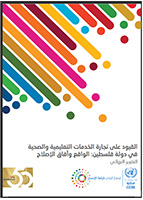
In the framework of the United Nations Development Account project (13th Tranche) on: “Trade policies and frameworks to foster regional integration and the achievement of the Sustainable Development Goals in selected conflict and post-conflict Arab countries”, ESCWA, in collaboration with UNCTAD and the Palestinian Ministry of National Economy (MoNE) has just issued a publication, in Arabic (cf. link below), containing a study that analyses legislative and regulatory measures governing the trade in health and education services in the State of Palestine.
Findings of this study are geared towards unleashing the trade potential of Education and Health Services in the State of Palestine, by addressing the legislative and regulatory reform needed to foster a better climate for investment in and development of the two sectors. The ultimate goal of such reform is to enhance the economic and trade performance for job creation and the supply of quality education and health services in the State of Palestine.
Key messages:
- Despite the increasing pressure imposed by the occupation authorities on all components of the Palestinian economy at all stages of production and trade operations, in many instances the Palestinian economic policies themselves play, to some extent, restrictive role affecting trade patterns for educational and health services; which calls for reviewing the regulatory framework that governs the flow of investments in education and health, whether local or foreign. In addition, Palestinian Authorities could consider reviewing the existing regulations and laws for these sectors, drawing on international best practices and in line with the country’s public policy objectives.
- Contrary to trade in goods, fears of losing jobs in Palestinian educational and health services institutions as a result of trade openness are unjustified as services trade is conducted, in large proportion, through foreign direct investment, which represents one of the most important reasons for countries’ tendency to integrate these sectors into trade agreements because of their direct role in generating new job opportunities and not reducing them.
- This report does not call for the full liberalization of the services sector, but rather for an examination and review of domestic policies, laws and restrictions to raise the efficiency of this sector and its ability to foster comprehensive development process in the State of Palestine. As confirmed by the results of the questionnaires addressed to providers of Palestinian education and health services, there is a pressing need to review several legislations and practices, responsible for the many prevailing restrictions on investment and the movement of labor and capital.




